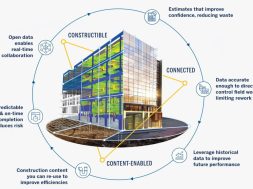Insights from Trimble on the impact of virtual construction

By embracing cutting-edge technologies like drones and BIM, India’s construction industry improves project efficiency and lowers expenditures and delays.
Although it is widely acknowledged that improving India’s infrastructure is crucial for accelerating the country’s economic growth, the implementation of numerous infrastructure projects has frequently been fraught with issues such as delays and overspending. Data released in April 2024 by the Ministry of Statistics and Programme Implementation (MoSPI) shows that, of the 1,873 projects in India under observation, 449 have gone over budget and 779 have experienced delays. The updated estimates for these projects, which were initially projected to cost ₹ 26.87 lakh crore, have risen to ₹ 31.88 lakh crore, representing an increase in overall expenses of 18.65 percent.
With 1,093 projects, road projects account for the greatest share and have experienced a comparatively mild cost overrun from ₹ 8.38 lakh crore to ₹ 8.68 lakh crore. However, railway-related initiatives have encountered many difficulties. The initial cost of ₹ 4.44 lakh crore for 249 railway projects has risen to ₹ 6.85 lakh crore, a 54 percent increase.
Although there are a variety of causes for these delays and overspending, employing cutting-edge technologies and procedures can often boost productivity and guarantee project completion on schedule. Building Information Modelling (BIM) is one of the most revolutionary tech-enabled methods in contemporary construction. It makes it possible to create comprehensive 3D models that include all relevant information about a construction project.
BIM facilitates stakeholder collaboration in addition to improving visualisation. Industry sources state that between 2023 and 2024, the use of BIM software increased by 35 percent as more construction companies included these digital tools in their project management procedures.
Major infrastructure projects in India have greatly reduced errors and rework by implementing BIM. One such instance is the Dwarka Motorway project, which made substantial use of BIM technology. This project was made simpler by the 3D BIM models created in Tekla Structures. The design team’s efficiency was significantly enhanced with Tekla Structures. Dwarka Motorway is a model project for other large-scale infrastructure projects, as its use of BIM has facilitated better coordination and timely completion.
Drones are another piece of technology that is revolutionising construction and building: site monitoring and surveying. Drones have been used successfully by the Mumbai Coastal Road Project to track development and make sure the project stays on schedule. Aerial views of construction sites and real-time data are provided by drones, which come with high-resolution cameras and sensors, unlike traditional surveying methods that take a long time and are frequently inaccurate. This enables project managers to identify any problems early and come to wise judgements.
The fusion of contemporary technologies such as Artificial Intelligence, Machine Learning (AI and ML), and the Internet of Things (IoT) signifies a noteworthy advancement, as it permits sophisticated predictive analytics and instantaneous monitoring, augmenting the overall efficacy of projects and reducing expenses and time. By assessing enormous volumes of data, such as supply chain logistics and meteorological conditions, AI and ML may anticipate possible delays. For instance, Trimble’s Connect platform optimises project schedules and resource allocation by fusing AI and IoT to provide real-time updates and insights. The complex functions of Trimble Connect enable improved project team collaboration and communication, enabling prompt interventions and minimising unforeseen delays.
At the very least, the introduction of digital twin technology is transforming the administration of construction projects by enabling predictive maintenance and real-time monitoring, which guarantees that projects wrap up on schedule and under budget. A primary catalyst for the expansion of India’s construction sector in the aftermath of the COVID pandemic was the government’s redoubled emphasis on infrastructure development. The industry-wide adoption of new technologies and environmentally friendly practices are being accelerated by this focus.
We think that project management is becoming more accurate and effective as a result of the new technology being incorporated into the Indian construction industry. Construction businesses are not only overcoming old obstacles but also leading the road for timely and sustainable infrastructure development by utilising BIM, drones, AI, IoT, and digital twin technologies. India’s construction industry offers a bright future as long as these technologies continue to advance and are adopted by the country’s infrastructure corporations. Massive projects will be finished on schedule and within budget, which will ultimately fuel the country’s rapid economic expansion.
For more information, visit: https://www.trimble.com/en
Cookie Consent
We use cookies to personalize your experience. By continuing to visit this website you agree to our Terms & Conditions, Privacy Policy and Cookie Policy.






